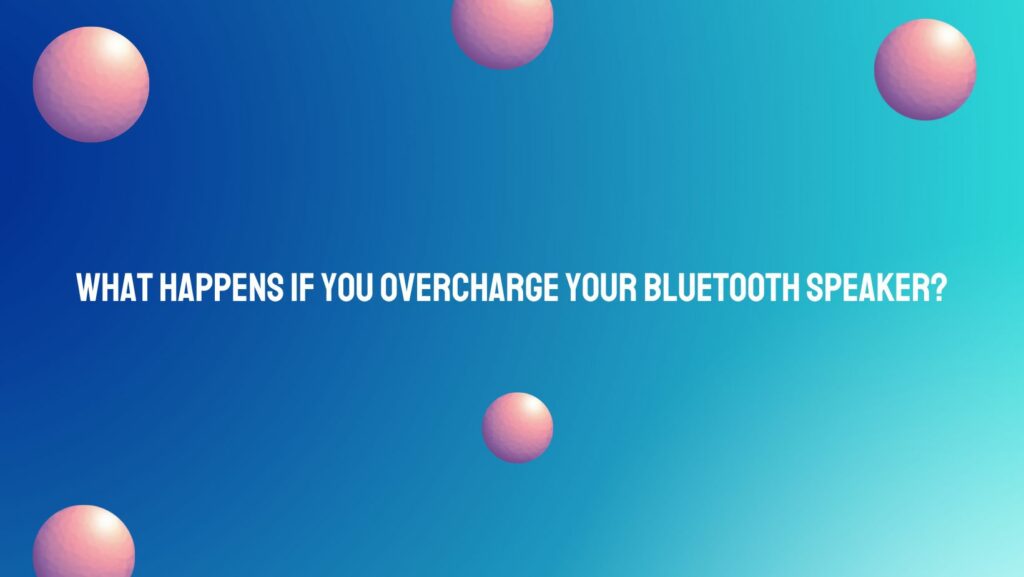Bluetooth speakers have become an integral part of modern life, providing a convenient and portable way to enjoy music and audio on the go. To keep these devices functional, it is crucial to understand how to properly charge them. Overcharging your Bluetooth speaker can lead to a range of issues that affect both the device’s performance and its overall longevity. In this comprehensive article, we will explore the consequences of overcharging your Bluetooth speaker and provide guidance on how to prevent and mitigate these problems.
- Understanding Overcharging
Overcharging occurs when a battery is subjected to a charging voltage beyond its recommended limit. Most Bluetooth speakers use lithium-ion (Li-ion) or lithium-polymer (LiPo) batteries, which have built-in protection circuits to prevent overcharging. When fully charged, these batteries should stop receiving power from the charger, thus preventing damage.
- Consequences of Overcharging
Overcharging your Bluetooth speaker can have several negative consequences:
a. Reduced Battery Lifespan: Over time, excessive overcharging can degrade the battery’s capacity and reduce its lifespan. The more often you overcharge, the more significant the impact on the battery’s longevity.
b. Decreased Capacity: Batteries that have been frequently overcharged tend to hold less charge, resulting in shorter playback times between charges. This can be frustrating, especially if you rely on your Bluetooth speaker for extended use.
c. Heat Generation: Overcharging can cause the battery to heat up, potentially leading to overheating. In extreme cases, overheating can be a fire hazard, posing a significant safety risk.
d. Battery Swelling: Prolonged overcharging can cause the battery to swell, which can exert pressure on the speaker’s components and potentially damage it internally.
e. Reduced Performance: Overcharged batteries may not perform at their optimal levels, affecting the overall sound quality and output of the Bluetooth speaker.
- How to Prevent Overcharging
To prevent overcharging and its associated problems, follow these guidelines:
a. Use the Right Charger: Ensure you use the charger that came with the Bluetooth speaker or a charger that meets the manufacturer’s specifications. Using third-party chargers that deliver too much power can increase the risk of overcharging.
b. Unplug When Fully Charged: Pay attention to your speaker’s charging indicator. When it indicates a full charge, promptly unplug the charger to prevent overcharging.
c. Avoid Charging for Extended Periods: While it’s not always possible to unplug your speaker as soon as it’s charged, avoid leaving it plugged in for extended periods unnecessarily. Disconnect it from the charger when not in use.
d. Follow the Manufacturer’s Guidelines: Read the user manual and guidelines provided by the manufacturer for charging recommendations specific to your Bluetooth speaker model.
- Mitigating Overcharging Damage
If you suspect that your Bluetooth speaker’s battery has been overcharged, you can take some steps to mitigate the damage:
a. Discontinue Use: If you notice any signs of battery swelling, overheating, or poor performance, stop using the speaker immediately.
b. Replace the Battery: If the battery damage is severe, consider replacing the battery if your speaker allows for this. Consult the manufacturer’s instructions or a professional technician for guidance.
c. Professional Repair: If your Bluetooth speaker experiences severe internal damage due to overcharging, it may require professional repair. Attempting to repair it yourself can further damage the device.
Conclusion
Overcharging your Bluetooth speaker can result in a range of issues that impact its battery lifespan, performance, and safety. It is essential to follow proper charging practices, use the correct charger, and unplug your speaker once it reaches a full charge. Additionally, regularly inspect your speaker for signs of battery damage and take immediate action if you notice any issues. By following these guidelines, you can help ensure the longevity and safety of your Bluetooth speaker while enjoying uninterrupted, high-quality audio experiences.


